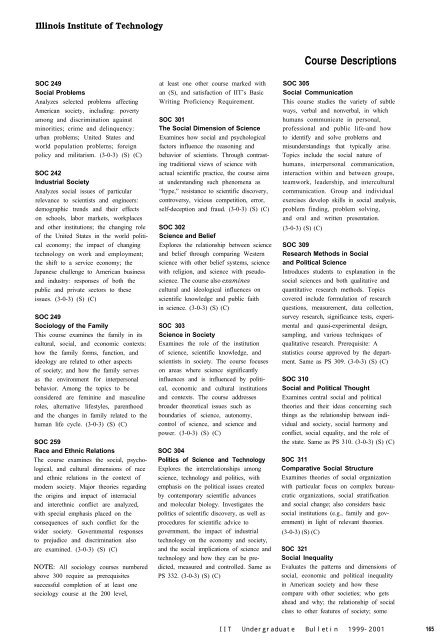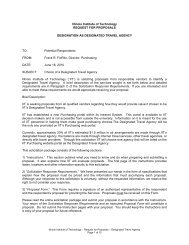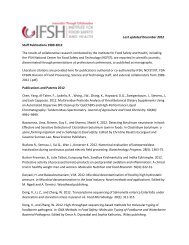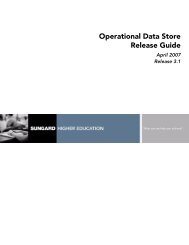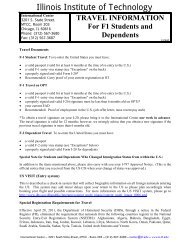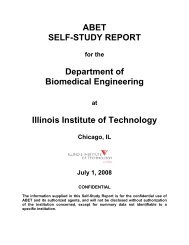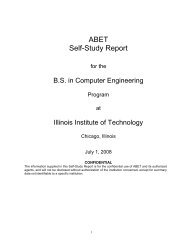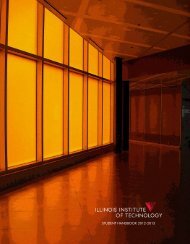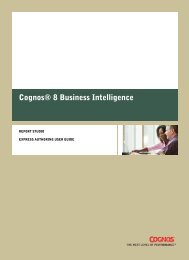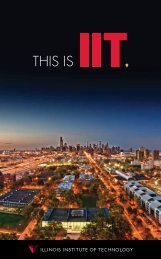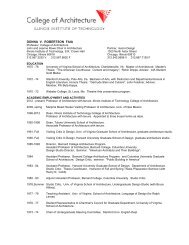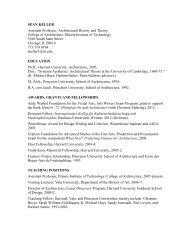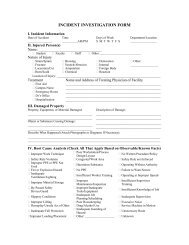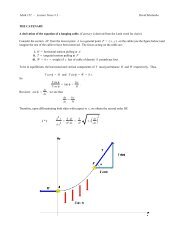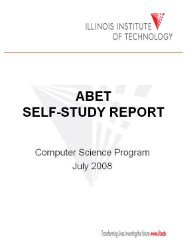Copyright & Disclaimer Information - Illinois Institute of Technology
Copyright & Disclaimer Information - Illinois Institute of Technology
Copyright & Disclaimer Information - Illinois Institute of Technology
You also want an ePaper? Increase the reach of your titles
YUMPU automatically turns print PDFs into web optimized ePapers that Google loves.
<strong>Illinois</strong> <strong>Institute</strong> <strong>of</strong> <strong>Technology</strong><br />
SOC 249<br />
Social Problems<br />
Analyzes selected problems affecting<br />
American society, including: poverty<br />
among and discrimination against<br />
minorities; crime and delinquency:<br />
urban problems; United States and<br />
world population problems; foreign<br />
policy and militarism. (3-0-3) (S) (C)<br />
SOC 242<br />
Industrial Society<br />
Analyzes social issues <strong>of</strong> particular<br />
relevance to scientists and engineers:<br />
demographic trends and their effects<br />
on schools, labor markets, workplaces<br />
and other institutions; the changing role<br />
<strong>of</strong> the United States in the world political<br />
economy; the impact <strong>of</strong> changing<br />
technology on work and employment;<br />
the shift to a service economy; the<br />
Japanese challenge to American business<br />
and industry: responses <strong>of</strong> both the<br />
public and private sectors to these<br />
issues. (3-0-3) (S) (C)<br />
SOC 249<br />
Sociology <strong>of</strong> the Family<br />
This course examines the family in its<br />
cultural, social, and economic contexts:<br />
how the family forms, function, and<br />
ideology are related to other aspects<br />
<strong>of</strong> society; and how the family serves<br />
as the environment for interpersonal<br />
behavior. Among the topics to be<br />
considered are feminine and masculine<br />
roles, alternative lifestyles, parenthood<br />
and the changes in family related to the<br />
human life cycle. (3-0-3) (S) (C)<br />
SOC 259<br />
Race and Ethnic Relations<br />
The course examines the social, psychological,<br />
and cultural dimensions <strong>of</strong> race<br />
and ethnic relations in the context <strong>of</strong><br />
modem society. Major theories regarding<br />
the origins and impact <strong>of</strong> interracial<br />
and interethnic conflict are analyzed,<br />
with special emphasis placed on the<br />
consequences <strong>of</strong> such conflict for the<br />
wider society. Governmental responses<br />
to prejudice and discrimination also<br />
are examined. (3-0-3) (S) (C)<br />
NOTE: All sociology courses numbered<br />
above 300 require as prerequisites<br />
successful completion <strong>of</strong> at least one<br />
sociology course at the 200 level,<br />
<strong>Copyright</strong> & <strong>Disclaimer</strong> <strong>Information</strong>: <strong>Copyright</strong> © 1994, 1995, 1996, 1997, 1998, 1999, 2000, 2001, 2002, 2003, 2004, 2005, 2006, 2007. CollegeSource®, Inc. and Career Guidance Foundation. CollegeSource® digital catalogs are derivative works owned and copyrighted by CollegeSource®, Inc. and Career Guidance Foundation. Catalog content is owned and copyrighted by the appropriate school. While CollegeSource®, Inc. and Career Guidance Foundation provides information as a service to the public, copyright is retained on all digital catalogs.<br />
<strong>Copyright</strong> & <strong>Disclaimer</strong> <strong>Information</strong>: <strong>Copyright</strong> © 1994, 1995, 1996, 1997, 1998, 1999, 2000, 2001, 2002, 2003, 2004, 2005, 2006, 2007. CollegeSource®, Inc. and Career Guidance Foundation. CollegeSource® digital catalogs are derivative works owned and copyrighted by CollegeSource®, Inc. and Career Guidance Foundation. Catalog content is owned and copyrighted by the appropriate school. While CollegeSource®, Inc. and Career Guidance Foundation provides information as a service to the public, copyright is retained on all digital catalogs.<br />
at least one other course marked with<br />
an (S), and satisfaction <strong>of</strong> IIT’s Basic<br />
Writing Pr<strong>of</strong>iciency Requirement.<br />
SOC 301<br />
The Social Dimension <strong>of</strong> Science<br />
Examines how social and psychological<br />
factors influence the reasoning and<br />
behavior <strong>of</strong> scientists. Through contrasting<br />
traditional views <strong>of</strong> science with<br />
actual scientific practice, the course aims<br />
at understanding such phenomena as<br />
“hype,” resistance to scientific discovery,<br />
controversy, vicious competition, error,<br />
self-deception and fraud. (3-0-3) (S) (C)<br />
SOC 302<br />
Science and Belief<br />
Explores the relationship between science<br />
and belief through comparing Western<br />
science with other belief systems, science<br />
with religion, and science with pseudoscience.<br />
The course also examines<br />
cultural and ideological influences on<br />
scientific knowledge and public faith<br />
in science. (3-0-3) (S) (C)<br />
SOC 303<br />
Science in Society<br />
Examines the role <strong>of</strong> the institution<br />
<strong>of</strong> science, scientific knowledge, and<br />
scientists in society. The course focuses<br />
on areas where science significantly<br />
influences and is influenced by political,<br />
economic and cultural institutions<br />
and contexts. The course addresses<br />
broader theoretical issues such as<br />
boundaries <strong>of</strong> science, autonomy,<br />
control <strong>of</strong> science, and science and<br />
power. (3-0-3) (S) (C)<br />
SOC 304<br />
Politics <strong>of</strong> Science and <strong>Technology</strong><br />
Explores the interrelationships among<br />
science, technology and politics, with<br />
emphasis on the political issues created<br />
by contemporary scientific advances<br />
and molecular biology. Investigates the<br />
politics <strong>of</strong> scientific discovery, as well as<br />
procedures for scientific advice to<br />
government, the impact <strong>of</strong> industrial<br />
technology on the economy and society,<br />
and the social implications <strong>of</strong> science and<br />
technology and how they can be predicted,<br />
measured and controlled. Same as<br />
PS 332. (3-0-3) (S) (C)<br />
Course Descriptions<br />
SOC 305<br />
Social Communication<br />
This course studies the variety <strong>of</strong> subtle<br />
ways, verbal and nonverbal, in which<br />
humans communicate in personal,<br />
pr<strong>of</strong>essional and public life-and how<br />
to identify and solve problems and<br />
misunderstandings that typically arise.<br />
Topics include the social nature <strong>of</strong><br />
humans, interpersonal communication,<br />
interaction within and between groups,<br />
teamwork, leadership, and intercultural<br />
communication. Group and individual<br />
exercises develop skills in social analysis,<br />
problem finding, problem solving,<br />
and oral and written presentation.<br />
(3-0-3) (S) (C)<br />
SOC 309<br />
Research Methods in Social<br />
and Political Science<br />
Introduces students to explanation in the<br />
social sciences and both qualitative and<br />
quantitative research methods. Topics<br />
covered include formulation <strong>of</strong> research<br />
questions, measurement, data collection,<br />
survey research, significance tests, experimental<br />
and quasi-experimental design,<br />
sampling, and various techniques <strong>of</strong><br />
qualitative research. Prerequisite: A<br />
statistics course approved by the department.<br />
Same as PS 309. (3-0-3) (S) (C)<br />
SOC 310<br />
Social and Political Thought<br />
Examines central social and political<br />
theories and their ideas concerning such<br />
things as the relationship between individual<br />
and society, social harmony and<br />
conflict, social equality, and the role <strong>of</strong><br />
the state. Same as PS 310. (3-0-3) (S) (C)<br />
SOC 311<br />
Comparative Social Structure<br />
Examines theories <strong>of</strong> social organization<br />
with particular focus on complex bureaucratic<br />
organizations, social stratification<br />
and social change; also considers basic<br />
social institutions (e.g., family and government)<br />
in light <strong>of</strong> relevant theories.<br />
(3-0-3) (S) (C)<br />
SOC 321<br />
Social Inequality<br />
Evaluates the patterns and dimensions <strong>of</strong><br />
social, economic and political inequality<br />
in American society and how these<br />
compare with other societies; who gets<br />
ahead and why; the relationship <strong>of</strong> social<br />
class to other features <strong>of</strong> society; some<br />
IIT Undergraduate Bulletin 1999-2001 165


